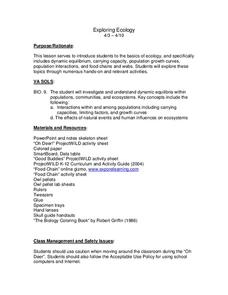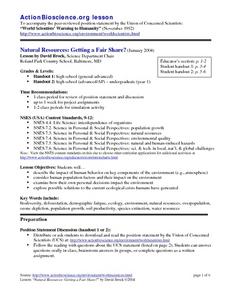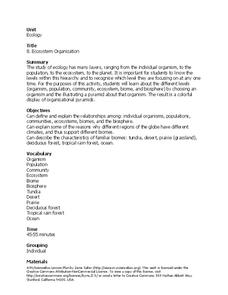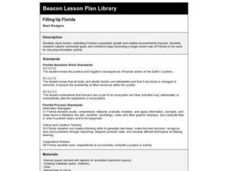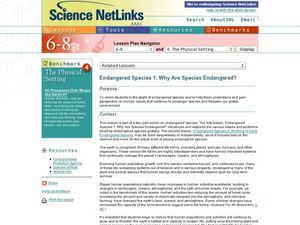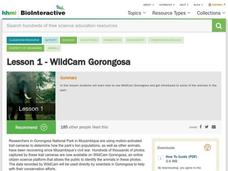Curated OER
Ecological Relationships
Students identify ecological elements and their factors on species, populations and food webs. They analyze ecosystems for these elements and research how these factors influence species survival rate. Predictions on conditions over time...
Curated OER
Zebra Mussel Population Simulation
Students are taught how to format and enter data into an Excel spreadsheet. They make a graph, and interpret graphed data. Students discuss the possible impacts of zebra mussels on the Hudson river. They graph zebra mussel data.
Chicago Botanic Garden
Leaf Litter Ecology Lab
Some organisms spend their entire lives in leaf litter. The third in a series of six is a great instructional activity exploring the community of leaf litter. Groups gather and then spread leaf litter over white paper and remove...
Curated OER
Exploring Ecology
Students explore the basics of ecology through numerous hands-on and relevant activities. They participate in an online food chain demonstration, which explores food web dynamics. They dissect owl pellets, examine the prey's bones, and...
Curated OER
Natural Resources: Getting a Fair Share?
Students explore the impact of human behavior on key components of the environment, examine how theirn own personal decisions have added to the problem, and explore possible solutions to the current ecological crisis.
Curated OER
Ecosystem Organization
Students examine the structure of ecosystems. In this ecology lesson, students listen to a lecture on relationships among organisms and biomes. Students use the information to create ecosystem organization pyramids.
Curated OER
Interactions Among Living Things
Students role play predators and prey, classify organisms as predator or prey, and describe factors that affect population growth and size.
Curated OER
Pond Life Identification Kit
Young scholars explore ecology and biodiversty. They use the wet-mount procedure to make several slides to view using the microscope and draw what they see.
Curated OER
Personal Ecosystem
Students build an aquatic ecosystem using large glass pickle jars. In this ecology lesson, students build and ecosystem then observe and collect data on the habitats. In this long term project students observe a...
Curated OER
Filling Up Florida
Students study factors controlling Florida's population growth and related environmental impacts. They research natural community types and construct maps (including a large-sized map of Florida) to be used for a simulation activity.
Curated OER
Radical Raptors
Students define raptor, explain why raptors are important, describe unique physical characteristics of various types of raptors, and explain life cycle of raptors. Students then play Habitat Game, describe food and hunting habits of...
Curated OER
Cypress/Tupelo Swamps
Students study the geologic history of terrain, soils, and drainage patterns. They recognize ecological processes that determine the dynamic nature of habitats. They investigate the influence of human activity on the landscape.
Curated OER
Red Mangroves Of Southern Florida
Middle schoolers engage in a unit plan to examine the ecological background for the Mangroves of southern Florida. They conduct research using print and computer technology sources. They use the information in a number of other extension...
Curated OER
To Clear or Not To Clear, That Is the Question
Pupils plan how to manage a fictional timber resource. In this earth science lesson plan, pupils research the options and repercussions of logging a forested plot of land. Pupils consider the implications of logging to the...
Curated OER
Sense Of Place
Students study ecology, listen to speakers and research conservation topics. In this investigative lesson students discuss wilderness resources, learn about Native Americans and participate in activities that help them to better...
Curated OER
Taming Wild Land
Third graders consider the habitat needs of living things and how extensive farming in an area can affect the plants and animals of a region. They participate in a simulation to show how changing the habitat in one area can greatly...
Curated OER
Endangered Species 1: Why are Species Endangered?
Emerging ecologists examine endangered species by visiting the US Environmental Protection Agency website. They consider human contribution to the decline of different species. They research an endangered animal and then craft a poster...
Curated OER
Land Use Unit
Pupils identify factors in human society and the natural environment aree interdependent. They analyze interdependencies demonstrated in various situations and occurances.
Curated OER
Life Beyond the Fifty Yard Line -- An ecological look at our backyard
Students, in groups, stake out and rope off their study area, do population counts and density studies. They construct a map of the whole area, collect plants and insects, and mount and identify the organisms using keys.
Curated OER
Making Connections, Linking Population and the Environment
Students find out that all habitats have a carrying capacity. They explore how the world's human population has grown markedly in the 20th century, and that humans impact environmental health. Students investigate that people can and...
Curated OER
Hare and Lynx Population
Fourth graders study changes in animal population. For this graphing lesson, 4th graders create graphs from information read to them about hares and lynx populations. They will describe patterns of change in the graphs and discuss why...
Howard Hughes Medical Institute
Lesson 2: Gorongosa National Park
How has Gorongosa National Park changed over time? Discover the park's rich history, dating back to primitive human times, through an interactive timeline and scientific reading. The second installment in an eight-part series explores...
Howard Hughes Medical Institute
Lesson 1: WildCam Gorongosa
Take a walk on the wild side! Episode one of an eight-part series of interactive lessons regarding Gorongosa National Park invites learners to become a part of the citizen science community. Scholars read a brief overview of the trail...
Curated OER
Shrinking Spaces
Students describe the impact of population growth on the environment. They describe how cities affect their surrounding environment and explain how cities are handling growth and its resulting effect on the quality of life. They visit...
Other popular searches
- Human Population Ecology
- Population Ecology Lab
- Community Ecology Population
- Biology Population Ecology
- Plant Population Ecology
- Population Ecology Plants
- Population Ecology Webquest
- Population Ecology Bacteria
- Population Ecology Web Quest
- Uk Population Ecology
- Population Ecology Graphing
- Census Population Ecology



